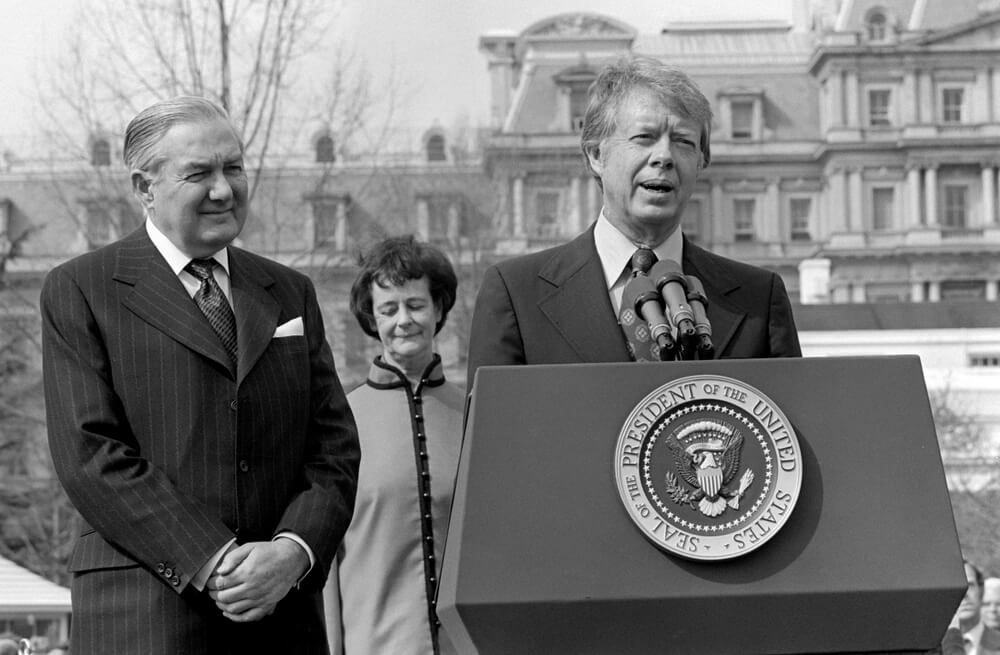The passing of Jimmy Carter, the 39th President of the United States of America, marks the end of an era in American politics and global diplomacy. His century-long biography reflects a life dedicated to public service, human rights, and international peace, leaving an indelible impression on the history of the 20th and 21st centuries. Often misunderstood as a politician in his time, Carter's achievements now receive the recognition they truly deserve.
Carter's victory in the 1976 presidential election was a historic moment. America sought a leader capable of reinstating public trust in the political system after the Watergate scandal and President Richard Nixon's resignation caused political turbulence.
As a relatively unknown governor from Georgia, Carter won the favour of Americans through his authenticity, his moral integrity, and his promise to create a "government of the people."
His campaign was based on a simple but powerful message: fight corruption, protect civil rights, and restore economic stability.
He defeated Republican Gerald Ford in one of the most uncertain races in American history. Carter represented both a refreshment and a return to basic values—a man with a peanut farm who believed in the power of ordinary people.
Camp David 1978
Carter took office at a time when the world was undergoing profound geopolitical and economic changes. The Yom Kippur War had ignited the Middle East, the Cold War was in full swing, and an energy crisis and inflation shook the global economy.
One of his greatest achievements was the conclusion of the historic peace agreement between Egypt and Israel at Camp David in 1978.
Carter succeeded in reaching an agreement that ended decades of hostility and laid the groundwork for future peace initiatives
After intense negotiations with Egyptian President Anwar al-Sadat and Israeli Prime Minister Menachem Begin, Carter succeeded in reaching an agreement that ended decades of hostility and laid the groundwork for future peace initiatives.
It was not only a diplomatic triumph but also an example of how the perseverance and personal commitment of a leader can change the course of history.
However, his administration faced numerous challenges.
Iranian hostage crisis
The 1979 Iranian hostage crisis severely damaged his reputation as president. The Iranian revolution and the seizure of the American embassy in Tehran symbolised a change in global dynamics—the beginning of an era in which local conflicts increasingly spilled over to the global level.
Jimmy Carter became one of the few politicians whose work gained global significance after his presidency when he received the Nobel Peace Prize in 2002.
The Nobel Committee emphasised his "untiring effort to find peaceful solutions to international conflicts, to advance democracy and human rights, and to promote economic and social development."
Carter Center has emerged as a leading voice in the global battle to eradicate disease, enhance agricultural practices, and oversee elections
Established in 1982, his Carter Center has emerged as a leading voice in the global battle to eradicate disease, enhance agricultural practices, and oversee elections.
His contribution to the eradication of diseases such as Guinea-worm was revolutionary, and his commitment to electoral justice brought legitimacy to many young democracies.
Cooperation with Brezhnev
Powerful leaders like Leonid Brezhnev in the Soviet Union, Margaret Thatcher in the United Kingdom, and Deng Xiaoping in China dominated the global scene at the time of Carter.
His cooperation with Brezhnev led to the signing of the Strategic Arms Limitation Treaty, SALT II, which laid the foundation for later arms control efforts.
 President Carter's relations with allies in Europe and Asia demonstrated the complexity of international diplomacy - President Jimmy Carter welcomes PM James Callaghan of the UK
President Carter's relations with allies in Europe and Asia demonstrated the complexity of international diplomacy - President Jimmy Carter welcomes PM James Callaghan of the UK
At the same time, his relations with allies in Europe and Asia demonstrated the complexity of international diplomacy. His persistence in certain aspects of realpolitik often drew criticism, despite his deep moral convictions as a leader.
Many of the problems Carter faced remain unresolved to this day. Despite his efforts, the Middle East remains a theatre of conflict. Climate change, which he spoke about back in the 1970s, has developed into a global crisis.
Human rights issues are still current, and the world is facing new challenges such as growing inequality and the erosion of democracy.
Leadership does not end with a term in office
No president in American history was as active after the end of his term in office as Jimmy Carter. He directed his energy towards humanitarian work, which included constructing homes for the homeless through Habitat for Humanity and resolving international conflicts through the Carter Center. His example shows that leadership does not end with a term in office.
Carter was also a prolific writer, publishing numerous books on politics, religion, and global issues. His introspective works illuminated the inner dilemmas and values that guided him throughout his career.
Jimmy Carter was not a perfect president, but he was a man whose values shaped his policies and his life
Jimmy Carter was a leader who firmly believed in the power of diplomacy, moral responsibility, and personal commitment. At a time when global crises demanded visionary responses, Carter remained true to his principles. His departure leaves a void in a world that is perhaps now more than ever looking for leaders of his calibre—leaders who understand that true power lies in serving people rather than dominating them.
Jimmy Carter was not a perfect president, but he was a man whose values shaped his policies and his life. Today, as we face many of the challenges he tried to solve, the question remains: Where are the leaders like Jimmy Carter? His life's journey reminds us that true leaders are not those who seek power but those who use it for the common good.